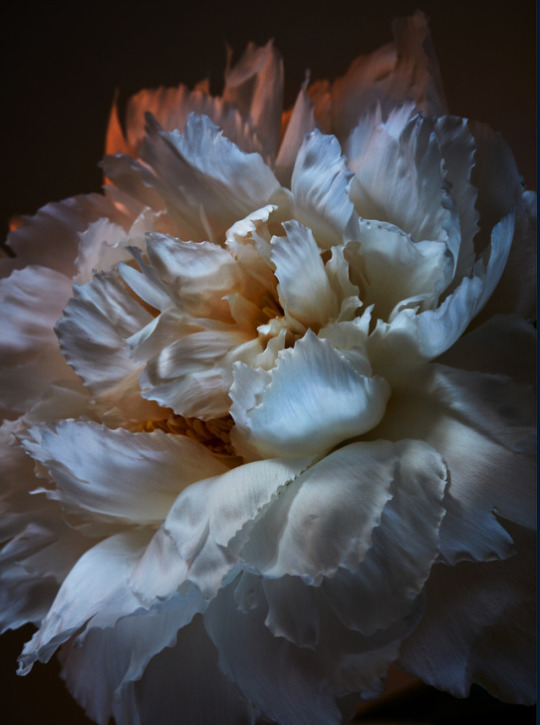Insights and Reflections from Buddhist and other Spiritual Traditions
Don't wanna be here? Send us removal request.
Text
The Miracle of Life
“People usually consider walking on water or in thin air a miracle. But I think the real miracle is not to walk either on water or in thin air, but to walk on earth. Every day we are engaged in a miracle which we don’t even recognise: a blue sky, white clouds, green leaves, the black, curious eyes of a child - our our own two eyes. All is a miracle.”
- Thich Nhat Hanh, The Miracle of Mindfulness.
129 notes
·
View notes
Text
Notions of Happiness
‘Our notions of happiness entrap us. We forget that they are just ideas. Our idea of happiness can prevent us from actually being happy. We fail to see the opportunity for joy that is right in front of us when we are caught in a belief that happiness should take a particular form.’
- Thich Nhat Hanh, The Miracle of Mindfulness.
66 notes
·
View notes
Text
Embracing the Unbearable
‘Rather than seek God - the goal of the brahmins - Gotama suggested that you turn your attention to what is most far from God: the anguish and pain of this life on earth. In a contingent world, change and suffering are inevitable. Just look at what happens here: creatures are constantly being born, falling ill, growing old, and dying. These are the unavoidable facts of our existence. And when I am honest with myself, when I drop all my stoic conceits, this is unbearable.
To embrace the contingency of one’s life is to embrace one’s fate as an ephemeral but sentient being. As Nietzsche claimed, one can come to love that fate. But to do so one must first embrace it, though one instinctively recoils at such a prospect. To steady one’s gaze on the finitude, contingency, and anguish of one’s existence is not easy; it requires mindfulness and concentration. One needs to make a conscious shift from delight in a fixed place to awareness of a contingent ground…’
- Stephen Batchelor, Confession of a Buddhist Atheist.
55 notes
·
View notes
Text
Self-Knowledge
‘Certainly, self-knowledge is important if we are to live honestly, but we should find the kind of balance that allows us to acknowledge our good points as well as our bad. The real motive for self-examination is not so that we can convict ourselves of being miserable sinners, but so we can grow in self-knowledge in order to modify the damaging effect we may have had on other people. Socrates said that the unexamined life is not worth living; we could also say that the unexamined life is not worth dying either. When taking stock, we should be honest about what we have done badly, making every effort, before it is too late, to mend relationships we have damaged; but we should also affirm what we have done well in our journey through life.
Most lives have had their share of sorrow and endurance, but they are an achievement nevertheless. And we ought to acknowledge that there was a certain givenness about our lives that was not of our choosing. We played the hand we were dealt at birth. It is a mysterious fact that not only were some people given better cards than others, but some of them were better at playing the game.
Nietzsche said that the strong are good at self-forgetting and self-forgiving because they do not allow their own failings and failings to assume a dominant role in their consciousness. In the energetic living of any life, mistakes will be made, but we should not allow them to derail us from our good purposes; nor should we allow the memory of them to obscure the record of the satisfactions life has brought us.’
- Richard Holloway, Looking in the Distance.
66 notes
·
View notes
Text
The Zen of an Aching Heart
‘“Your days pass like rainbows, like a flash of lightning, like a star at dawn. Your life is short. How can you quarrel?”
~Buddha
In the Jewish mystical tradition, one great Rabbi taught his disciples to memorize and contemplate the teachings and place the prayers and holy words on their heart. One day a student asked the Rabbi why he always used the phrase “on your heart” and not “in your heart,” and the master replied, “Only time and grace can put the essence of these stories in your heart. Here we recite and learn them and put them on our hearts hoping that some day when our heart breaks they will fall in.”
But when our heart breaks—in love, in friendship, in partnership—it is always a very difficult experience. Modern neuroscience has even discovered that the emotional suffering we experience registers in the same areas of the brain as physical pain. So when we’re feeling abandoned and rejected, we don’t want to eat, we can’t sleep, we have difficulty breathing, our bodies feel as if we have the flu or we’ve been run over by a truck.
So, what can we do when we have to accept the loss of a friend or a loved one? What truth can we find beyond the stories we tell ourselves about how they’re wrong and we’re right, or that we’re wrong and they’re right? What can we do besides spending fruitless hours trying decipher everything they said or did? Can we do something more useful than justifying to ourselves what we said or did, or wishing that we had said or done something else? And what can we do when the story spreads to nearly drown us in despair over feelings that there’s something wrong with us, that we’re unlovable, that we’re the reason things didn’t work out?
Like a sandcastle, all is temporary.
Build it, tend it, enjoy it.
And when the time comes
let it go.
The first thing you need to do when you’ve suffered loss or betrayal is to find a way to regain your wise heart so that you can let it hold the aching of your heart. The Zen teacher Karlfried Von Durckheim speaks of the importance of the need to go through our difficulties in a conscious and clear way.
The person who, already being on the way, falls upon hard times in the world, will not as a consequence turn to those friends who offered them refuge and comfort and encourage their old self to survive. Rather, they will seek out someone who will faithfully and inexorably help them to risk themselves, so they may endure the difficulty and pass courageously through it. Only to the extent that a person exposes themselves over and over again to annihilation and loss can that which is indestructible be found within them. In this daring lie dignity and the spirit of true awakening.
Sometimes suffering the losses and the unexpected betrayals and break-ups that befall each of us becomes the places where we grow deepest in our capacity to lead an authentic and free life. Often by working our way through our difficulties, our ability to love and feel compassion for ourselves and others deepens, along with the wisdom that will help us through similar problems in the future. And learning how to survive our present difficulties is one of the few things that will help us to know the right things to say and do when others whom we love suffer as well.’
- Jack Kornfield, A Lamp in the Darkness: Illuminating the Path Through Difficult Times.
145 notes
·
View notes
Text
Simply Witness
‘This is maybe the greatest gift we can give another human being—our undivided attention. To listen without judgment or agendas. The great psychologist Carl Rogers once described empathy as “looking with fresh and unfrightened eyes.”’
- Frank Ostaseski, On What to Do When the Going Gets Rough
92 notes
·
View notes
Text
Healing the Mind
‘Just as we heal the body and the heart through awareness, so can we heal the mind. Just as we learn about the nature and rhythm of sensations and feelings, so can we learn about the nature of thoughts. As we notice our thoughts in meditation, we discover that they are not in our control- we swim in an uninvited constant stream of memories, plans, expectations, judgments, regrets. The mind begins to show how it contains all possibilities, often in conflict with on another- the beautiful qualities of a saint and the dark forces of a dictator and murderer. Out of these, the mind plans and imagines, creating endless struggles and scenarios for changing the world.
Yet the very root of these movements of mind is dissatisfaction. We seem to want both endless excitement and perfect peace. Instead of being served by out thinking, we are driven by it in many unconscious and unexamined ways. While thoughts can be enormously useful and creative, most often they dominate our experience with ideas of likes versus dislikes, higher versus lower, self versus other. They tell stories about our successes and failures, plan our security, habitually remind us of who and what we think we are.
The dualistic nature of thought is a root of our suffering. Whenever we think of ourselves as separate, fear and attachment arise and we grow constricted, defensive, ambitious, and territorial. To protect the separate self, we push certain thing away, while to bolster it we hold on to other things and identify with them.
A psychiatrist from the Stanford University School of Medicine discovered these truths when he attended his first ten-day intensive retreat. While he had studied psychoanalysis and been in therapy, he had never actually encountered his own mind in the nonstop fashion of fifteen hours a day of sitting and walking meditation. He later wrote an article on this experience in which he described how a professor of psychiatry felt sitting and watching himself go crazy. The nonstop flood of thought astounded him, as did the wild variety of stories it told. Especially repetitious were thoughts of self-aggrandizement, of becoming a great teacher or famous writer or even world savior. He knew enough to look at the source of these thoughts, and he discovered they were all rooted in fear: during the retreat he was feeling insecure about himself and what he knew. These grand thoughts were the mind’s compensation so he would not have to feel the fear of not knowing. Over the many years since, this professor has become a very skillful meditator, but he first had to make peace with the busy and fearful patterns of an untrained mind. He has also learned, since that time, not to take his own thoughts too seriously.
Healing the mind takes place in two ways: In the first, we bring attention to the content of our thoughts and learn to redirect them more skillfully through practices of wise reflection. Through mindfulness, we can come to know and reduce the patterns of unhelpful worry and obsession, we can clarify our confusion and release destructive views and opinions. We can use conscious thought to reflect more deeply on what we value. Asking the question, Do I love well? from the first chapter is an example of this, and we can also direct our thought into the skillful avenues of loving-kindness, respect, and ease of mind. Many Buddhist practices use the repetition of certain phrases in order to break through old, destructively repetitious patterns of thought to effect change.
However, even though we work to reeducate the mind, we can never be completely successful. The mind seems to have a will of its own no matter how much we wish to direct it. So, for a deeper healing of the conflicts of the mind, we need to let go of our identification with them. To heal, we must learn to step back from all the stories of the mind, for the conflicts and opinions of our thoughts never end. As the Buddha said, “People and opinions just go around bothering one another.” When we see that the mind’s very nature is to think, to divide, to plan, we can release ourselves from its iron grip of separatism and come to rest in the body and heart. In this way, we step out of our identification, our of our expectations, opinions, and judgments and the conflicts to which they give rise. The mind thinks of the self as separate, the heart knows better. As one great Indian master, Sri Nisargadatta, put it, “The mind creates the abyss, and the heart crosses it.”
Many of the great sorrows of the world arise when the mind is disconnected from the heart. In meditation we can reconnect with our heart and discover an inner sense of spaciousness, unity, and compassion underneath all the conflicts of thought. The heart allows for the stories and ideas, the fantasies and fears of the mind without believing in them, without having to follow them or having to fulfill them. When we touch beneath all the busyness of thought, we discover a sweet, healing silence, an inherent peacefulness in each of us, a goodness of heart, strength and wholeness that is our birthright. This basic goodness is sometimes called our original nature, or Buddha nature. When we return to our original nature, when we see all the ways of the mind and yet rest in this peace and goodness, we discover the healing of the mind.’
- Jack Kornfield. A Path With Heart: A Guide Through the Perils and Promises of Spiritual Life.
95 notes
·
View notes
Text
On “Buddhism Without Beliefs”
‘Instead of being the noncontentious introduction to Buddhism that was initially conceived, “Buddhism without Beliefs” triggered what Time magazine, in its cover issue on Buddhism in America, called “a civil but ferociously felt argument” about whether it was necessary for Buddhists to believe in karma and rebirth. I had proposed in the book that one could hold an agnostic position on these points, i.e., keep an open mind without either affirming or denying them. Naively perhaps, I had not anticipated the furor that this suggestion would create.
The ensuing controversy showed that Buddhists could be as fervent and irrational in their views about karma and rebirth as Christians and Muslims could be in their convictions about the existence of God. For some Western converts, Buddhism became a substitute religion every bit as inflexible and intolerant as the religions they rejected before becoming Buddhists. I argued that Buddhism was not so much a creedal religion as a broad culture of awakening that, throughout its history, had shown a remarkable ability to adapt to changing conditions. For a while I hoped that “Buddhism without Beliefs” might stimulate more public debate and enquiry among Buddhists about these issues, but this dis not happen. Instead, it revealed a fault line in the nascent Western Buddhist community between traditionalists, for whom such doctrines are nonnegotiable truths, and liberals, like myself, who tend to see them more as contingent products of historical circumstance.
What is it that makes a person insist passionately on the existence of metaphysical realities that can be neither demonstrated nor refuted? I suppose some of it has to do with the fear of death, the terror that you and your loved ones will disappear and become nothing. But I suspect that for such people, the world as presented to their senses and reason appears intrinsically inadequate, incapable of explaining this fraught and brief life on earth. One assumes the existence of hidden forces that lie deep beneath the surface of the contingent and untrustworthy world of day-to-day experience. Many Buddhists would argue that to jettison belief in the law of karma - a scheme of moral bookkeeping mysteriously inhering within the structure of reality itself - would be tantamount to removing the foundations of ethics. Good acts would not be rewarded and evil deeds not punished. Theists have said exactly the same about the consequences of abandoning belief in God and the divine judgment.’
- Stephen Batchelor, Confession of a Buddhist Atheist.
35 notes
·
View notes
Text
Mysteries Beyond Description
‘Religions may begin as vehicles of longing for mysteries beyond description, but they end up claiming exclusive descriptive rights to them. They segue the ardour and uncertainty of seeking to the confidence and complacence of possession. They shift from poetry to packaging. Which is what people want. They don’t want to spend years wandering in the wilderness of doubt. They want the promised land of certainty, and religious realists are quick to provide it for them. The erection of infallible systems of belief is a well-understood device to still humanity’s fear of being lost in life’s dark wood without a compass. ‘Supreme conviction is a self-cure for the infestation of doubts.’ That is why David Hume noted that, while errors in philosophy were only ridiculous, errors in religion were dangerous. They were dangerous because when supreme conviction is threatened it turns nasty.’
- Richard Holloway, Leaving Alexandria: A Memoir of Faith and Doubt.
41 notes
·
View notes







